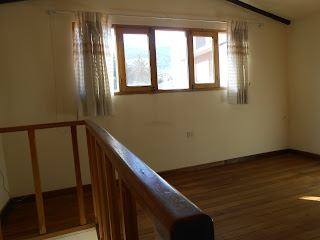Last week, I started off an awesome weekend by attending a cooking class. The subject: salteñas. Salteñas are a savory pastry often eaten between the hours of 9:00 am and 12:00 pm. You can often find them on the corner of busy streets here in Cochabamba.
 |
| Our Finished Salteñas |
A group of about 10 of us, made the masa or dough, made three separate fillings, two vegetarian and one with meat, and folded close to 55 of these delicious pastries. Rather than using a rolling pin to roll out the large sheets of dough we made, we used a huge rock to flatten the dough.
We filled small circles of dough with the different fillings and popped all of the finished salteñas into the freezer overnight. We put them in the oven the next day and ate snacks for dinner on Friday night.
After eating waaay too many salteñas for dinner a few of us went out to celebrate the last night of one of our volunteers in Bolivia.
The next day I had the incredible pleasure of walking alongside Mr. Gay Cochabamba 2016, members of Vivo en Positivo, an organization working with those who live with HIV/AIDS and to educate others about HIV/AIDS, and other Sustainable Bolivia volunteers in the Cochabamba Pride Parade. The music, dancing, and people lining the streets of Cochabamba made me so incredibly happy that night.
Honestly, I think my favorite part of pride was seeing the number of people who brought their children to the parade. There were no people protesting the parade, no one shouting anti-LGBT hate, there was simply happiness and love. Cochabamba was not a place I expected to find something like this, and yet, on the streets of Cochabamba, on a Saturday night, I found that in Cochabamba, despite the machismo culture here, there is love for all people, no matter their sexual orientation or gender identity, or anything else for that matter.
To cap off a great weekend, that Sunday was the Fiesta Boliviana at the Sustainable Bolivia house. There was traditional food and dancing, as well as some lectures on the history of Cochabamba, Quechua, the indigenous language, and how to drink Chicha, a fermented corn alcohol drink.
 |
| Table of snacks and other local treats |
I was there from about 10 in the morning, helping to prepare food until about 7 at night dancing and eating and enjoying the company of the other Sustainable Bolivia volunteers. Many of us left to go watch the final match of the Copa America games. However, while we were watching the game, one of the wires to the neon signs in the window behind our table caught on fire. The waiters were not paying any attention to us, so it took a while for us to get their attention yelling "fuego" and pointing. They brought us a free pitcher of Taquiña, basically the Bud Light of Bolivia, for helping them spot the fire before it got out of control. Most people in Bolivia dislike Chile because they did not support their claim in the war, so they were disappointed when Chile won, especially in PKs.
A few days after, I went from thriving in Bolivia to surviving in Bolivia when I started with the stomach flu. I'm happy my body waited to get sick until half way through my trip because I was comfortable enough with my surroundings that I could walk to the corner store to get a Powerade and comfortable enough with my Spanish and my host family that I could explain my symptoms and what I was and was not comfortable eating. 4 days later, I am now doing much better, but not convinced I will ever feel 100% for the duration of my stay. It is so dry here that I feel dehydrated nearly every morning when I wake up.
Since I was feeling well enough yesterday evening, I attended an art show put on by some of the Sustainable Bolivia volunteers and our artist in residence, Sandra.
The art studio at the Sustainable Bolivia house was beautifully decorated with the books that were created by women who are served by an organization called Infante, which works with mothers who are victims of domestic violence.
54% of women in Bolivia experience sexual or domestic violence at some point in their life. All of the women who created books in the art show last night have left their abusive partners and cook and create works of art as forms of therapy.
I ended up not staying too late due to my aforementioned stomach flu recovery, but all-in-all everything in Cochabamba is great. I look forward to 5 more great weeks here in Bolivia!
Paz
Paz
























